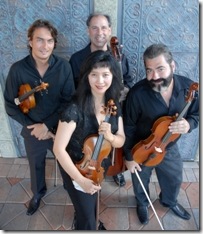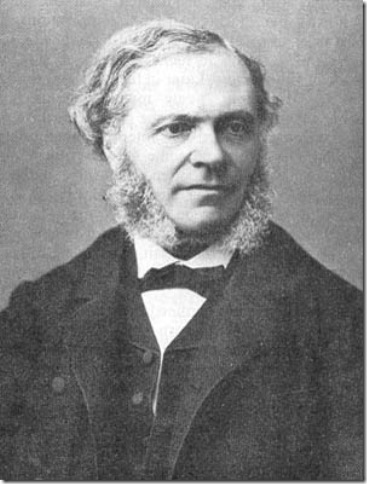There were two moments Sunday afternoon in a concert by the Delray String Quartet that gave encouraging hints about the kind of ensemble this foursome is becoming.
The first moment came in the first movement of the Beethoven Fourth Quartet (in C minor, Op. 18, No. 4), around about the recapitulation, when it suddenly became clear that the musicians were working at a unified purpose, feeling and interpreting the music as one unit rather than four separate ones.
The second came toward the end of the first movement of the Piano Quintet in F minor of César Franck, when all four of the players took up a keening unison motif above the thunder of pianist Tao Lin: Here was the same effect, a single voice rising in passion and agony, a solitary shout rather than a conversation.
It helped, no doubt, that the Delray was playing these two works for the third time in three days, having opened its sixth season for the first time with a series of concerts, not lone events. Insiders said audiences Friday night in Coral Gables and Saturday night in Fort Lauderdale were rather large and enthusiastic, and so the Sunday afternoon performance at The Colony Hotel in Delray, to its usual warm reception, was a homecoming of sorts.
 The stakes are now higher for the quartet of violinists Mei-Mei Luo and Laszlo Pap, violist Richard Fleischman and cellist Claudio Jaffé. The group must now dig deeper for real interpretive mastery as it attempts to regionalize its brand, and Sunday’s concert showed there’s good reason to think it can pull it off. That’s not to say the quartet has yet attained the status of the most elite chamber groups, but it seems to me that by the end of this season it will have moved up to a higher level.
The stakes are now higher for the quartet of violinists Mei-Mei Luo and Laszlo Pap, violist Richard Fleischman and cellist Claudio Jaffé. The group must now dig deeper for real interpretive mastery as it attempts to regionalize its brand, and Sunday’s concert showed there’s good reason to think it can pull it off. That’s not to say the quartet has yet attained the status of the most elite chamber groups, but it seems to me that by the end of this season it will have moved up to a higher level.
The Beethoven quartet, for example, had an aggressive, almost savage quality in its speedier movements, an approach that brought the innovatory brilliance — not to say weirdness — of Beethoven’s mind to the fore. Good ensemble is critical here because without it, you can’t follow the composer’s dazzling effects. The Delray was admirably tight in the faster movements, though a less-than-clean transition to the trio of the Scherzo hurt its hushed beauty, so different from the music that came before.
In the graceful second movement, the Delray focused on lightness and delicacy, and while it was often quite effective, it fell just shy of the absolute precision necessary to implant the character of the music in the listener’s ear. Still, the quartet displayed a disciplined feel for quiet dynamics, and that helped provide strong contrast with the movements on either side of it.
The quartet also showed that it could handle the very fast repeat of the Scherzo and the coda of the finale with aplomb, and that made the closing bars of the Beethoven truly exciting. All in all, a well-considered, rough-and-ready version of this fine example of early Beethoven, one that raises the perhaps not-so-idle thought of what it would be like to hear this quartet tackle the other five Op. 18 quartets.
The second half of the program contained the Franck Quintet, which doesn’t seem to get too many outings these days, and that’s unfortunate. It’s an anguished, lovely work of late Romanticism, and its intriguing back story of the unhappily married Franck’s crush on his beautiful young Irish student, Augusta Holmes, makes it a most appealing document of a midlife crisis.
Pianist Lin was the Delray’s partner in this three-movement cyclical work, and he proved to be a good one. His initial solo statements were a little too dry, cutting off too suddenly, but he raised tremendous amounts of sound in the quintet’s climactic moments, playing the cascades of arpeggios (Franck was a first-rate pianist as well as organist) with glitter and force.
The five musicians were totally committed to the quintet’s emotional upheaval, climbing again and again to thunderous outbursts of the falling-scale main theme as well as the yearning cyclic motif. In fact, the intensity scarcely lessened anywhere in this performance, which filled the piece with a nerves-on-edge near-hysteria that kept the listener engaged throughout.
This was true even in the soft second movement, but here the music could have used more contrast. Lin was a bit too loud and the tempo a shade too fast to offer something of a release from all that tension, and so Luo’s initial statement sounded more like an afterthought to what came before instead of a lonely, sad theme all its own.
A fine demonstration of how effectively the Delray poured its efforts into the Franck Quintet came with the encore, the Scherzo from the Dvorak Piano Quintet in A, Op. 81, which the Delray recorded last year. Even though it’s music from about the same period as the Franck, it couldn’t be more different in attitude, and the initial bars were a bit messy before everyone successfully regrouped.
The Delray String Quartet’s next series of concerts features the early Overture in C minor (D. 8a) of Franz Schubert, the String Quartet in F of Maurice Ravel, and the Fifth String Quartet of the Brazilian master Heitor Villa-Lobos. Concerts are set for 7:30 p.m. Saturday, Jan. 2, at All Saints Episcopal in Fort Lauderdale, 4 p.m. Sunday, Jan. 3, at the Colony Hotel in Delray Beach, and 8 p.m. Friday, Jan. 8, at St. Thomas Episcopal in Coral Gables. Tickets for the Lauderdale and Coral Gables concerts are $20; $35 in Delray. Call 213-4138 or visit www.delraystringquartet.com.
